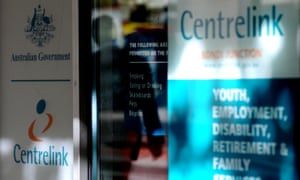Exclusive: government tells court it should not have to pay damages over scheme and denies alleged debtors were placed under duress
The government has claimed it does not owe welfare recipients a duty of care over the robodebt scandal and has denied alleged debtors were placed under “duress”, despite admitting in court documents that some debts were based on “false” assumptions.
As the Coalition refuses to provide its legal advice about the scheme to a Senate inquiry, documents filed in the federal court reveal the government has conceded that debts issued using tax office income summaries could “not be validly established” under the law.
But in the documents, obtained by Guardian Australia, the government argues it should not be required to pay compensation because social security law makes no mention of a need to exercise “due or reasonable care”.As the Coalition refuses to provide its legal advice about the scheme to a Senate inquiry, documents filed in the federal court reveal the government has conceded that debts issued using tax office income summaries could “not be validly established” under the law.
While a federal court order striking out a Melbourne woman’s debt suggested the government now considers parts of the scheme unlawful, its defence to a class action filed by Gordon Legal represents its first public statement conceding that it issued potentially thousands of debts that were not valid under the law.
The debts considered unlawful are those in which Centrelink sought repayments from people based solely on the agency’s estimate of a person’s employment earnings, known as “income averaging”. In these cases, Centrelink did not obtain payslips or other evidence that could prove a person misreported their earnings.
In its defence to the class action, the Commonwealth admitted that in the case of the five lead applicants, income averaging was not “the same as their actual fortnightly income, and was not necessarily referable to or indicative of their actual income in any fortnight”.
And in such cases, the “fortnightly income assumption” relied on by Centrelink “was false”, the court documents say.
More than 600,000 debts have been issued under the robodebt scheme, which demanded people provide evidence to prove they did not underreport their income to Centrelink – which would led them to be overpaid welfare benefits. If they refused or could not obtain the documents, a debt was issued.
Services Australia, which runs Centrelink, is currently reviewing how many debts were raised in this fashion after the government said it would abandon the practice.
In its defence, the Commonwealth also argued it held no duty of care in social security law and that its methods of debt recovery – which can include the use of debt collectors and garnishee notices through the tax office – “do not amount to duress”, as claimed by Gordon Legal.
The government noted that some robodebt recipients, including two of the lead applicants in the case, had made “voluntary payments in response to notices issued [under the act]”.
Gordon Legal is calling for money recouped from debts issued without evidence to be returned to welfare recipients, potentially with interest, and for compensation for the distress and inconvenience alleged victims suffered.
The firm argues that people affected by the robodebt program were “vulnerable to any unlawful or unreasonable exercise” and had “insufficient resources, knowledge or capacity to question, challenge or demonstrate the falsity of the valid debt beliefs”.
The government recovered money from debt recipients under “duress” and should have foreseen that issuing and enforcing debts would “cause significant concern, stress, anxiety and stigma” and could cause “financial hardship”, the statement of claim says.
The class action’s five lead applicants
Applicant one- Issued a $4,399.13 Newstart debt plus $385.04 “recovery fee” in November 2016 based solely on Australian Taxation Office data
- Centrelink garnishees $142.54 through tax office; applicant pays $400 towards the debt
- Debt reduced to $2,905.03 (October 2018) and then $73.52 (December 2019) after further information provided to Centrelink
- Applicant receives $542.54 refund on 5 December 2019, shortly after Gordon Legal files papers in federal court
- Issued $3,096.26 Newstart and Youth Allowance debt in March 2018 based solely on tax office data
- Centrelink garnishees $803.96 from applicant’s tax return through ATO
- Debt is currently under review by Centrelink
- Issued $4351.07 Newstart debt in December 2018
- Debt varied after a review to $4,241.69 and a second debt added worth $1,896.91
- Government says debts were initially raised using a combination of payslips and tax office data, but finalised using payslips and payroll data
- Centrelink garnishees $4,513.01 through the tax office
- Issued $11,303.77 debt on September 2016 based in part on payslips and in part on ATO income data
- Debt increased to $12.720.72 after applicant provides bank statements to Centrelink
- Applicant had $20 a fortnight deducted from welfare payments to repay the debt
- Issued a $2.602.65 Newstart debt in November 2016 based solely on ATO data
- Debt increased to $2,366.05 after a May 2019 review, but $236.60 “recovery fee” removed
- Centrelink garnishees $1,162.95 from applicant via tax office in December 2018
- Debt reduced to $253.85 after applicant provides payslips for review finalised in December 2019
- Refund of $903.37 processed in December 2019

No comments:
Post a Comment